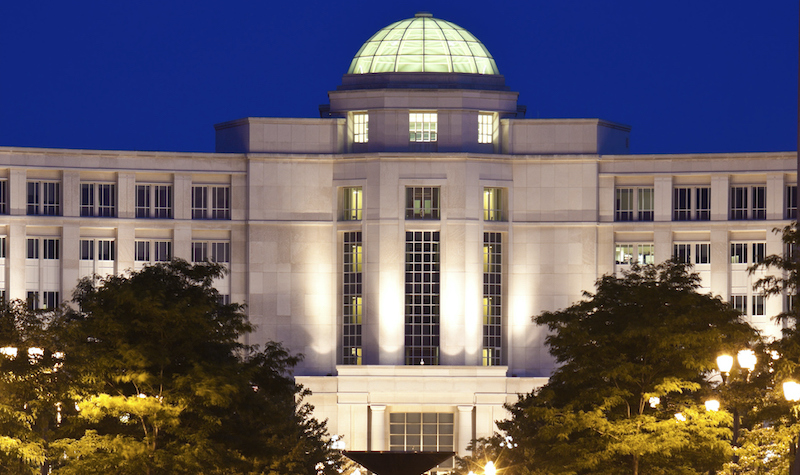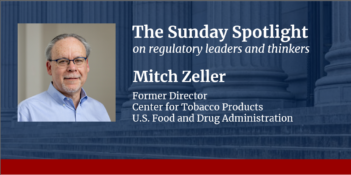
The U.S. Supreme Court could take a cue from Michigan and other states on reviving the nondelegation doctrine.
As President Donald J. Trump was on the verge of nominating Justice Ruth Bader Ginsburg’s replacement, I published an essay elsewhere on potential changes to the nondelegation and Chevron deference doctrines. I contended that any alteration in the size and scope of the administrative state “is likely to be more modest than melodramatic, with the array of agencies continuing to carry out their core missions, including protecting the health and safety of the American people.”
At the time that earlier essay was published, U.S. Court of Appeals for the Seventh Circuit Judge Amy Coney Barrett had not yet been nominated by President Trump. Now that she has been, I am not aware of anything that would change my conclusion.
Here, I want to concentrate only on the nondelegation doctrine, but this time at the state level, where much administrative law occurs—and often goes unnoticed. Earlier this month, the Michigan Supreme Court issued an important decision in Midwest Institute of Health v. Governor in which the court held that Michigan’s Emergency Powers of the Governor Act of 1945 (EPGA) constitutes “an unlawful delegation of legislative power to the executive branch in violation of the Michigan Constitution.”
Michigan Governor Gretchen Whitmer invoked the EPGA in declaring a state of emergency and issuing executive “lockdown” orders in response to the COVID-19 pandemic. The governor issued a succession of executive orders over a six-month period limiting public and private gatherings, imposing restrictions upon certain businesses, and regulating a broad variety of other aspects of Michiganders’ daily lives.
The EPGA states that, after declaring a state of emergency, “the governor may promulgate reasonable orders, rules, and regulations as he or she considers necessary to protect life and property or to bring the emergency situation within the affected area under control.” Any such “orders, rules, and regulations … shall cease to be in effect upon declaration by the governor that the emergency no longer exists.”
Addressing the nondelegation doctrine challenge, the Michigan Supreme Court explained that “challenges of unconstitutional delegation of legislative power are generally framed in terms of the adequacy of the standards fashioned by the legislature to channel the agency’s or individual’s exercise of the delegated power.” From another of its earlier decisions, the court explained that, “in making this determination whether the statute contains sufficient limits or standards, we must be mindful of the fact that such standards must be sufficiently broad to permit efficient administration in order to properly carry out the policy of the legislature but not so broad as to leave the people unprotected from uncontrolled, arbitrary power in the hands of administrative officials.”
The majority opinion written by Justice Stephen Markman also said that Michigan’s nondelegation case law is similar to the federally developed nondelegation doctrine case law—that, as the court put it quoting from Justice Elena Kagan’s majority opinion in the U.S. Supreme Court’s Gundy v. United States decision, “the constitutional question is whether Congress has supplied an intelligible principle to guide the delegee’s use of discretion.”
Justice Markman determined the EPGA’s terms “reasonable” and “necessary” to be “illusory ‘non-standard’ standards”:
The consequence of such illusory “non-standard” standards in this case is that the governor possesses free rein to exercise a substantial part of our state and local legislative authority—including police powers—for an indefinite period of time. There is … nothing within either the “necessary” or “reasonable” standards that serves in any realistic way to transform an otherwise impermissible delegation of legislative power into a permissible delegation of executive power.
Although there has not been a successful nondelegation doctrine challenge at the federal level since 1935, when the Supreme Court struck down two New Deal laws, state courts, invoking separation of powers principles under their own constitutions, have not been nearly so reticent to sustain nondelegation doctrine challenges. One does not have to reach back into ancient history to find such cases.
In a 2018 article, Edward Stiglitz examined state supreme court decisions from 1990 to 2010 in which the nondelegation doctrine was implicated. Based on a close reading of the 163 nondelegation cases, Stiglitz found that, in 22 of these, the state courts held that the challenged state statutes violated the nondelegation doctrine. So, the nondelegation doctrine is alive and well in the states.
This essay is not the place to examine the body of successful state nondelegation challenges, but a representative sample of a few of them, for a sense of the language used, includes the following: Florida Deptartment of State, Division of Elections v. Martin; Board of Trustees of the Judicial Form Retirement System v. Attorney General; and Guillou v. State of New Hampshire, Division of Motor Vehicles. In each instance, in one way or the other, the courts refer to the lack of sufficient guidance in the challenged law as an invitation for the exercise of arbitrary power or abuse of discretion by the administrative body.
No doubt a rejoinder to those who, like myself, would like to see the nondelegation doctrine revitalized at the federal level, is that line-drawing in nondelegation doctrine challenges is too difficult for the courts in assessing the work of another branch of government. As Justice Antonin Scalia put it in his dissenting opinion in Mistretta v. United States, the nondelegation doctrine is “not an element readily enforceable by the courts.”
Without denying that nondelegation doctrine challenges involve difficult line-drawing, I do not subscribe to the view that, for this reason, the federal courts can shirk their responsibility to enforce important constitutional separation of powers principles. As I have said elsewhere, the Supreme Court could reinvigorate the nondelegation at the federal level by undertaking a more exacting review that “would engage in a ‘hard look’ to determine whether the agency has given enough guidance to apply any necessary factual findings to the statutory criteria.”
In his separate opinion in the Michigan case invalidating the EPGA, Chief Justice Pro Tempore David Viviano put the stakes this way, saying that when a court declares that “reasonableness is enough to make a delegation proper, the court is not simply letting the legislature recalibrate its institutional interests,” but rather it “is allowing the legislature to pass off responsibility for legislating, thereby endangering the liberties of the people.”
Justice Viviano has this right. The U.S. Supreme Court might usefully look to the Michigan Supreme Court and other state supreme courts for inspiration to revitalize the nondelegation doctrine that is central to preserving the U.S. Constitution’s separation of powers.




